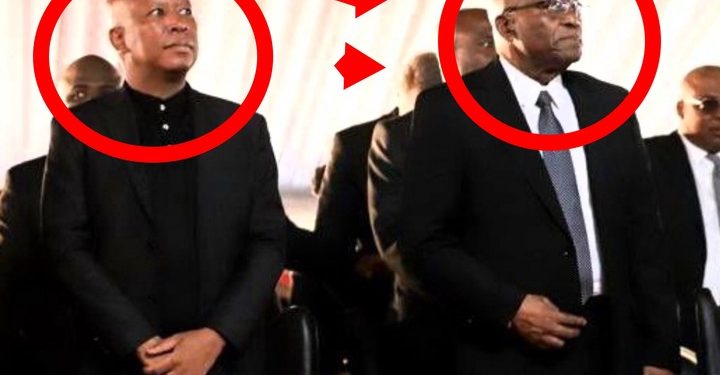The former president of South Africa, Jacob Zuma, announced his decision to join the Economic Freedom Fighters (EFF) party on 14 February 2024, a day after he was expelled from the African National Congress (ANC) for his involvement in corruption scandals. Zuma said he was “disheartened” to leave the ANC, the party he had been a member of since 1959, but he felt “sidelined” and “betrayed” by its leadership. He claimed that the EFF, a radical and militant opposition party led by Julius Malema, shared his vision of economic emancipation and social justice for the black majority.
Zuma’s move was met with mixed reactions from the public and the political sphere. Some of his loyal supporters, especially in his home province of KwaZulu Natal, welcomed his decision and vowed to follow him to the EFF. They said they still respected Zuma as a freedom fighter and a champion of the poor. Others, however, criticized Zuma for being a “political opportunist” and a “traitor” who was trying to escape accountability for his crimes. They accused him of joining the EFF to undermine the ANC and to destabilize the country.
The ANC expressed its disappointment and regret over Zuma’s departure, saying it was a “sad day” for the party and the nation. The ANC spokesperson said that Zuma had made a “grave mistake” by joining forces with the EFF, which he described as a “divisive and destructive” force that threatened the unity and democracy of South Africa. He said that the ANC would not be deterred by Zuma’s defection and would continue to work for the people and uphold the rule of law.
JACOB ZUMA on 14th FEBRUARY 2024:
"It is disheartening to leave the only party I grew up in & I only know
But I have decided, since I've been sidelined by the ANC, to join the organization which proposed similar values to me
I'm officially joining EFF with all my supporters!" pic.twitter.com/YK5KKaVAW5
— Sive ✨ (@SiveXaluva) August 6, 2023
The EFF welcomed Zuma with open arms, saying he was a “valuable addition” to their ranks. The EFF leader, Julius Malema, said that Zuma was a “victim of political persecution” by the ANC and its allies, who wanted to silence him and prevent him from exposing their corruption. He said that Zuma had a lot of experience and wisdom to offer to the EFF, which he hoped would help them win the upcoming general elections in 2025. He said that Zuma would be given a senior position in the EFF and would play a key role in their campaigns.
Zuma’s decision to join the EFF is seen as a major political shift in South Africa, which could have significant implications for the future of the country. Analysts say that Zuma’s move could boost the popularity and legitimacy of the EFF, which has been growing steadily since its formation in 2013. The EFF is known for its radical policies, such as land expropriation without compensation, nationalization of mines and banks, and free education and health care for all. The EFF is also known for its confrontational and populist style, which often clashes with the authorities and other parties.
On the other hand, Zuma’s move could also weaken and fracture the ANC, which has been ruling South Africa since 1994. The ANC has been facing internal divisions and public discontent over its performance and governance. The ANC has been accused of being corrupt, incompetent, and out of touch with the needs and aspirations of the people. The ANC has also been losing support to other parties, such as the Democratic Alliance, which is the main opposition party, and the Inkatha Freedom Party, which is dominant in KwaZulu-Natal.
Zuma’s decision to join the EFF could also have an impact on his legal troubles, which have been haunting him for years. Zuma is facing multiple charges of corruption, fraud, racketeering, money laundering, and tax evasion related to his involvement in a controversial arms deal in 1999. He is also facing charges of contempt of court for defying an order to appear before a commission of inquiry into state capture, which is investigating allegations that he allowed his friends and associates to influence government decisions and loot state resources. Zuma has denied all charges and claims that he is innocent.
Zuma’s supporters say that joining the EFF could give him more protection and leverage against his enemies in the judiciary and the media. They say that Zuma could use his influence in the EFF to mobilize mass protests and civil disobedience against his prosecution and conviction. They also say that Zuma could use his platform in the EFF to expose more corruption scandals involving his rivals in the ANC and other parties.
Zuma’s critics say that joining the EFF could backfire on him and make his situation worse. They say that Zuma could face more isolation and hostility from his former allies in the ANC and other parties. They also say that Zuma could face more scrutiny and pressure from the public and the courts, who would not be swayed by his political maneuvers. They also say that Zuma could face more challenges and conflicts within the EFF itself, which has its own factions and agendas.
Zuma’s decision to join the EFF has sparked a lot of debate and speculation in South Africa, which is facing many social and economic challenges. Some see it as a bold and strategic move that could change the political landscape and dynamics of the country. Others see it as a desperate and reckless move that could endanger the stability and democracy of the country. Only time will tell what the consequences and outcomes of Zuma’s move will be.






















